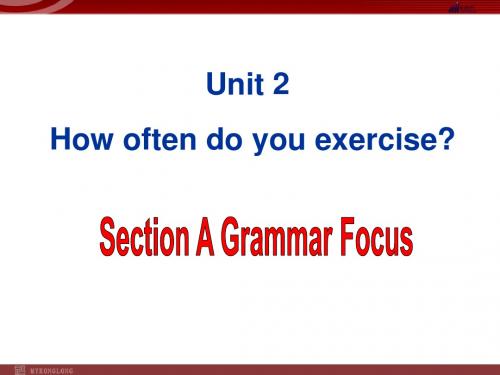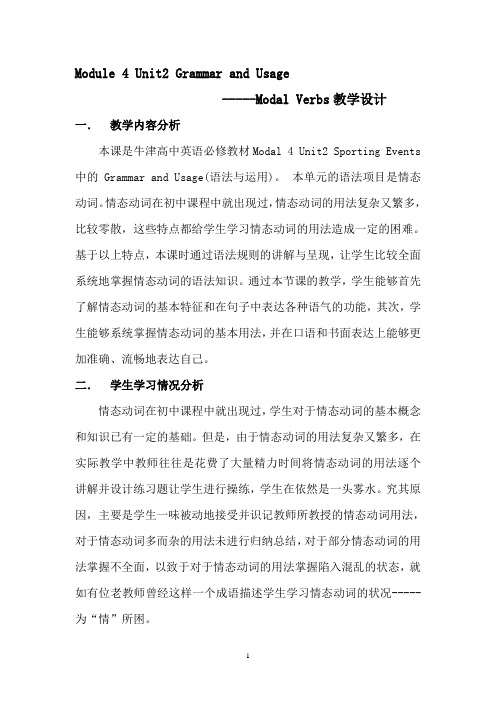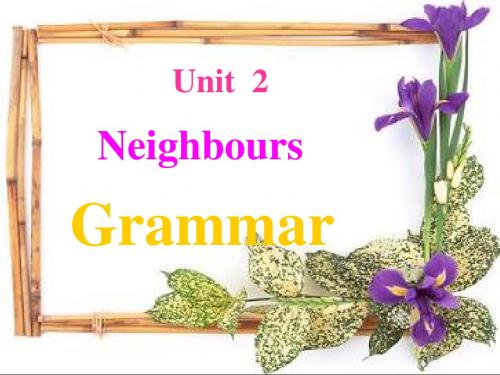Unit2grammar学案1
Unit 2 Section A Grammar Focus 案例

Unit 2
How often do you exercise?
Have a talk
What do you do on weekends?
1. Do homework 2. exercise 3. Go to the movies 4. Play football 5. Watch TV
6. reading
Then match the questions and answers.
a. Yes, she usually does. b. Hardly ever. I don’t like them. c. He plays at least twice a week. d. No, they don’t. They’re too busy. e. Never. They always go to bed early. f. Yes, I do. Every day.
B: I read English books about twice a week.
练习:
一、句型转换 1. She goes to the movies three times a month.(对划线部分提问) ____ How_____ often _____ does she go to the movies? 2. My mother wants me to play the guitar. (同义句转换) My mother______ _____ would like me to play the guitar.
高中英语新课标(人教版)必修I Unit2 Grammar1

(例: this 改为that), 如: 例 改为 He said, "These books are mine." →He said those books were his.
指示代词、时间状语、 指示代词、时间状语、地点状语的变 化: this→ that; these→ those ; now→ then; yesterday→ the day before; today→ that day; tomorrow→ the next day; next week (month, year)→ the next week (month, year); ago→ before; here→ there. .
9.The boy said, “May I go along with you?” The boy asked me ___. A. if I might go along with you B. if he might go along with you C. if he might go along with me D. if he might go along with the boy
2.疑问句的间接引语。一般疑问句后连接 疑问句的间接引语。 疑问句的间接引语 词用if或 词用 或whether,而引述选择疑问句时 , 只能用whether,引述动词用asked,没 ,引述动词用 只能用 , 有间接引语的可以加一个间接宾语me, 有间接引语的可以加一个间接宾语 him等。 例如: 等 例如: She said to Tom, “Can you help me?” → She asked Tom if /whether he could help her.
7. “You’ve already got well, haven’t you?” she asked. →She asked ________. A. if I have already got well, hadn’t you B. whether I had already got well C. have I already got well D. had I already got well.
Module 4 Unit2 Grammar and Usage的教学设计

Module 4 Unit2 Grammar and Usage-----Modal Verbs教学设计一.教学内容分析本课是牛津高中英语必修教材Modal 4 Unit2 Sporting Events 中的Grammar and Usage(语法与运用)。
本单元的语法项目是情态动词。
情态动词在初中课程中就出现过,情态动词的用法复杂又繁多,比较零散,这些特点都给学生学习情态动词的用法造成一定的困难。
基于以上特点,本课时通过语法规则的讲解与呈现,让学生比较全面系统地掌握情态动词的语法知识。
通过本节课的教学,学生能够首先了解情态动词的基本特征和在句子中表达各种语气的功能,其次,学生能够系统掌握情态动词的基本用法,并在口语和书面表达上能够更加准确、流畅地表达自己。
二.学生学习情况分析情态动词在初中课程中就出现过,学生对于情态动词的基本概念和知识已有一定的基础。
但是,由于情态动词的用法复杂又繁多,在实际教学中教师往往是花费了大量精力时间将情态动词的用法逐个讲解并设计练习题让学生进行操练,学生在依然是一头雾水。
究其原因,主要是学生一味被动地接受并识记教师所教授的情态动词用法,对于情态动词多而杂的用法未进行归纳总结,对于部分情态动词的用法掌握不全面,以致于对于情态动词的用法掌握陷入混乱的状态,就如有位老教师曾经这样一个成语描述学生学习情态动词的状况-----为“情”所困。
三.设计思想首先,“四段式”教学模式的指导思想要使学生“动”起来。
建构主义学习理论认为教学不是通过教师向学生单向传递知识就可以完成的,知识不只是通过教师传授得到的,而是学习者在一定的情境即社会文化背景下,借助其他人(包括教师和学习伙伴)的帮助,利用必要的学习资料,通过“意义建构”的方式而获得的。
教师不能直接将知识传递给学生,而是要组织、引导,使学生参与到整个学习过程中去。
其次,综观历年高考英语情态动词的考查情况,有相当一部分考题从本质上看都是考查情态动词在具体语境中的运用。
牛津英语 7下 Unit 2 Grammar

Don’t turn left at the second crossing.
Cross the road and you’ll see the museum. I don’t think we’ll have to go up again. Can he read a map?
Does he want to learn the road signs?
correct
1. Turn left at the second crossing.(改 为否定句) 2. Cross the road .You see the museum. (连接为并列句) 3. I think we’ll have to go up again.(改 为否定句)
4. He can read a map.(改为一般疑问句) 5. He wants to learn the road signs.(改 为一般疑问句)
…
will/shall = be going to
主语 + be going to +动词原形…?
人教新课标高中英语必修5 unit2 Grammar 过去分词作宾补教学课件(共 43 张PPT)(

某些及物动词 (如make等)
+
直接宾语(名 词或代词)
+ 宾语补足语
宾语 宾补 We think him clever.
What he said made me angry. They consider the answer correct. Everyone calls him Tom.
3.哪些可以做宾补?
1. His father named him Daming. (名词) 2. They painted their house white. (形容词) 3. You mustn’t force him to lend his
money to you. (动词不定式) 4. Nobody noticed him enter the room.
5)I heard the girls_in__g_in_g__ this English song in her room when I passed by.
5.Errors:
1. It was getting dark; I found a car sticking in a pool
by the side of the road.
7. Let the fresh air in. (副词)
8. The plant has its own name. You cannot call it what you will. (从句)
练习.观察下列句子的过去分词作什么成分
1. We found the egg eaten by the snake. 2. You’d better get the dangerous
(1) With water__h_e_a_t_e_d___(heat), we can see the steam.
牛津译林版八年级英语下册Unit 2 Grammar1课件

Millie: We (5)_h_a_v_e_b__ee_n_(be) to the beach. Look at this one. Isn’t it beautiful?
Daniel: Yes, the beach is very beautiful. I saw Andy there, too.
Daniel: (1)_H__a_v_e you ever b_e_e_n_(be) to Hongkong, Millie?
Millie: No, but I (2)_h_a_v_e_b__ee_n_(be) to Australia with my parents.
Daniel: Oh, that’s great! (3)_H_a_v_e_ you v_i_s_it_e_d_(visit) the famous Opera
某人去过某地,现在已经回来了。
For example:
Eddie has been to South Hill many times. It is very nice and he wants to go there again.
London
Tower Bridge
My friend Lucy has gone to __________. She will be back next week.
House in Sydney?
Millie: Yes, we (4)_h_a_v_e__b_e_en_ (be) to the Opera House. It was wonderful! Look at the photos.
Daniel: Wow! The Opera House is really wonderful, and you look great in the photos. Have you visited any other interesting places?
Unit_2__Neighbours__Grammar
What is the bear going to do tomorrow?
It is going to cook dinner.
Time expressions
tomorrow/ tomorrow morning/afternoon… the day after tomorrow next Tuesday/ /week/year/month/Sunday.. the coming Sunday /weekend/Tuesday tonight/this evening 不久 /this afternoon
四、 用所给动词的适当形式填空(注意时态) 1 Look, Lucy is watching(watch) Tv . 2 She is going to have ( have) a party next Sunday. 3 Listen, they are talking (talk) in the next room. 4 We are going to play (play) basketball tomorrow. 5 What are you doing (do) now? 6 Are they going to fly(fly) a kite tomorrow morning?
5.The students of Class Three have a field trip on Sunday.(用next Sunday改写) The students of Class Three _________ are going ________ to have ________ _________ a field trip next Sunday.
2) will +V (动词原形)
牛津译林版高中英语选修8精品学案Unit 2 The universal languageGrammar
class was over) 他要在下课前离开,但我告诉他不要那样做。
6.在疑问词后的省略who, which, when, where, why, how, what等疑问词在引导从句时,其后的成分如与句子中出现的成分相同,往往可以省去。
如:Someone has cleaned the classroom, but I don’t know who.(=who has cleaned the classroom)有人打扫了教室,但我并不知道是谁。
They are going abroad soon, but I don’t know when.(=when they are going abroad)他们不久就要出国了,但我不知道具体时间。
7.在复合句中的省略复合句中某些成分省略的情形也是很多的。
在回答问题时我们常这样说:1)—Can you come with your husband this afternoon?今天下午你和你丈夫能一道来吗?—I am afraid not.恐怕不能。
(=I am afraid that I can not come with my husband this afternoon.) 2)—Shall I make a copy of it?我是否复制一份?—Yes, if time permits.是的。
如时间容许,请复制一份。
(Yes, please make a copy of it if time permits.)8.有时“so”可用来代替一个从句,或从句的一部分,而把这一部分省略。
如:1)—Is he coming back tonight?他是否今晚回来?—I guess so. 我想是这样。
(代替He is coming back tonight.)2)—She may not be free today. 她今天下午可能没时间。
—If so, we’ll have to put th e meeting off. 如果那样的话,我们必须把会议推迟。
译林版高中英语必修三Unit2 Grammar and usage 教案
《英语》(必修·第三册)Unit 2 Natural disastersGrammar and usageI. Learning objectivesBy the end of the lesson, students will be able to:1. understand the functions of to-infinitives as attributives and adverbials of result;2. use to-infinitives as attributives and adverbials of result properly in different situations;3. rewrite a passage using to-infinitives.II. Key competence focusUse to-infinitives as attributives and adverbials of result correctly and properly.III. Predicted area of difficulty1. Use to-infinitives as attributives and adverbials of result in new situations.2. Rewrite a passage using to-infinitives.IV. Teaching proceduresStep 1 Lead-inT: Hello, everyone. Last period we read two news reports about the lucky escapes from two natural disasters. First, I’d like to show your some sentences in these two news reports.•Alice Brown, head teacher at Falmont Primary School, was teaching when the floor began to shake.•The moment the shaking stopped, Miss Brown sensed it was the best time for the class to make their escape.•She signalled to her students to exit the classroom in an orderly line covering their heads with their hands.•The kids were calm enough to protect themselves during the earthquake.•“We practise earthquake safety procedures twice a year,” said Miss Brown, “so the kids were calm enough to protect themselves during the earthquake.”T: In all these sentences, there’re to-infinitives used as different sentence elements. In today’s class, we will explore the rules concerning to-infinitives as attributives and adverbials of result and learn to use them in different situations.【设计意图:学生在初中阶段已经接触过动词不定式的一部分用法,所以先在学生相对熟悉的语境中呈现含有动词不定式的句子,然后再呈现新的语法知识——动词不定式作定语和结果状语,用这个方法帮助学生建立新旧知识之间的联系,从而顺利过渡到新知识的学习。
Unit 2 Grammar 基础知识及练习 2021-2022学年牛津译林版九年级英语下册
译林牛津英语9BUnit 2grammar基础知识梳理:1.work on the computer / work on a history projectwork out /work hard at /work as /work for2.interview an astronaut = have an interview with an astr onautn. interviewer3.leave for Shanghai4.practice playing the piano practise doing practice n. practical adj.5.search for information on the Internet6.read through all the passages without stopping7.The competition is well worth taking part in. be (well)worth do ing/n.8.make a great difference to our daily life9.change the way we live10.in ancient timese salt to help them keep fish or meat for a longer time12.go bad /go missing / go hungry / go wrong13.With the invention of the washing machine, people needn’t wash clothes by hand. / make journeys morecomfortable12. 他总是设法独自做每一件事。
He always manages to do everything by himself.13 宇航员们目前为下一次飞行做准备。
- 1、下载文档前请自行甄别文档内容的完整性,平台不提供额外的编辑、内容补充、找答案等附加服务。
- 2、"仅部分预览"的文档,不可在线预览部分如存在完整性等问题,可反馈申请退款(可完整预览的文档不适用该条件!)。
- 3、如文档侵犯您的权益,请联系客服反馈,我们会尽快为您处理(人工客服工作时间:9:00-18:30)。
1
Unit 2 Infinitives
Class __________________________ Name____________________________
不定式用法小结
构成:由_______和___________构成。
时态语态 主动 被动
一般式
完成式
一. 不定式的用法(在句中作主语):
动词不定式在句中作主语,一般情况下,常用作形式主语,将不定式后置。常用结构有:
It takes/took (somebody) (sometime) to do (something).
__________________________________________________________________________
It costs/cost (somebody) (sometime) to do (something).
__________________________________________________________________________
It+ be+ adj.+ of/for + n./pron. +to do something.
__________________________________________________________________________
Hans once drove another professor, Dr Long, to a university. They had a short talk on the way. Work in pairs.
S1 is Hans. S2 is Dr Long. Ask and answer.
Hans: Dr Long, how long did it take you to get here by air?
Long: ___________________________ (2 hours). How long will it take to get to the university from the
airport?
Hans: ________________________________________________ (40 minutes).
Long: You are a good driver. Is it difficult to learn how to drive?
Hans: No, __________________________. (easy)
Long: Is it expensive to live in your city?
Hans: Yes, ________________________________. (very expensive)
Long: Do you like your job?
Hans: Yes, I like it a lot. _____________________________________. (interesting)
二、 不定式作状语
1. 不定式作状语表示目的,或用在so as和in order之后,来强调这种目的。
为了更好地学习语言,你必须尽可能使用它。
_________________________________________________________________________
2. 不定式作状语表示结果,通常表示出乎意料的结果。
我尽快跑到了车站,却意外地发现火车已经走了。
_________________________________________________________________________
三、 不定式作后置定语
1. 作定语的动词不定式,总是放在它所修饰的名词或者代词之后。
Now China is the third country to send its astronauts into space after Russia and the US.
应当注意,如果不定式(短语)是不及物动词,其后应有必要的介词或副词。
I tried my best to find a nice house for her to live in.
四. 以下动词后,只能跟不定式作宾语补足语
Advise Cause Force Invite Remind tell
Allow Encourage Get Order Request Want
Ask Expect Inform Permit Teach Warn
2
动词不定式用法练习
I. Complete the following sentences with the correct form of “infinitive”.
1. He showed us ____________ (如何操纵) the new machine.
2. It is not difficult ____________ (学会一门外语).
3. I ask the students ____________ (读英语) in the morning.
4. They went there ____________ (看望父母) at weekends.
5. The workers were made ____________ (工作12小时) by the boss.
6. We asked the old man ______ ______ (讲自己的经历).
7. It will take you only about two hours ____________ (乘飞机去那儿).
8. To my surprise, she has the ability ____________ (讲四种语言).
II. Multiple-choice.
1. Volunteering gives you a chance ____________ lives, including your own.
A. change B. changing
C. changed D. to change
2. ____________ warm at night, I would fill the woodstove, then set my alarm clock for midnight so I could
refill it.
A. Staying B. Stayed
C. To stay D. Stay
3. I stopped the car ____________ a short break as I was feeling tired.
A. take B. taking C. to take D. taken
4. Let those in need ____________ that we will go all out to help them.
A. to understand B. understand
C. understanding D. understood
5. The airport ____________ next year will help promote tourism in this area.
A. being completed
B. to be completed
C. completed
D. having been completed
6. They might just have a place ____________ on the writing course—why don’t you give it a try?
A. leave B. left C. leaving D. to leave
